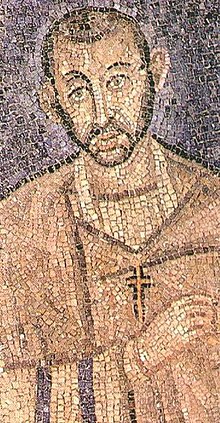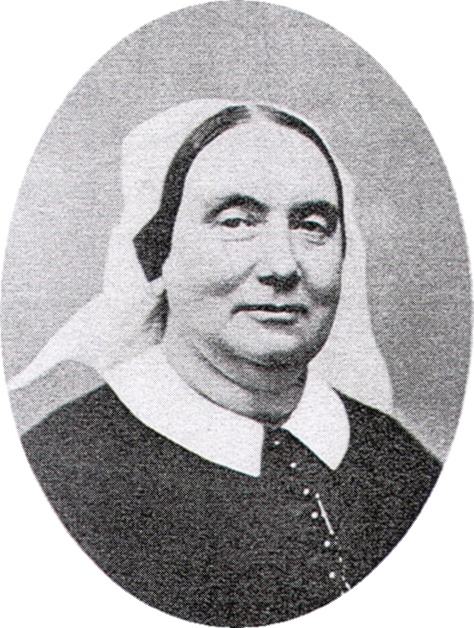NOTE: As part of our preparation for All Saints’ Sunday, here are some stories about a few of the saints of the Church. After you’ve read their stories, take the time to write a story of your own–the story of someone who inspired you!
 Ambrose (337-397) was a Roman governor in Northern Italy until the election of Bishop of Milan in 347. The Arian and Catholic factions of the church fought to control the diocese—a riot was almost at hand. Ambrose struggled to keep the peace, when the cry went up from both sides: “Ambrose, bishop!” While raised a Christian, Ambrose had not yet been baptized, but that didn’t prevent his election as bishop. Although he resisted, he was consecrated bishop (and baptized the week before). While Catholic in his beliefs, Ambrose’s reputation for theological charity made him the choice for both sides, but Ambrose was no mere compromiser. Once elected bishop, Ambrose adopted an ascetic lifestyle. He ended the Arian controversy primarily by the strength of his arguments—at one point the leading Arian bishops refused to debate him. Ambrose persuaded emperors, and when he couldn’t persuade, he resisted. In 385, the emperor and his mother, Justina, professed Arianism along with many of the clergy. They demanded that Ambrose give them the use of two of the churches in Milan, but Ambrose refused, vowing to die before the altar rather than give up one of this charges. Ambrose’s example of piety and eloquence was one of the deciding factors in Augustine of Hippo’s conversion to Christianity. Ambrose also wrote many hymns, even creating a style of chanting.
Ambrose (337-397) was a Roman governor in Northern Italy until the election of Bishop of Milan in 347. The Arian and Catholic factions of the church fought to control the diocese—a riot was almost at hand. Ambrose struggled to keep the peace, when the cry went up from both sides: “Ambrose, bishop!” While raised a Christian, Ambrose had not yet been baptized, but that didn’t prevent his election as bishop. Although he resisted, he was consecrated bishop (and baptized the week before). While Catholic in his beliefs, Ambrose’s reputation for theological charity made him the choice for both sides, but Ambrose was no mere compromiser. Once elected bishop, Ambrose adopted an ascetic lifestyle. He ended the Arian controversy primarily by the strength of his arguments—at one point the leading Arian bishops refused to debate him. Ambrose persuaded emperors, and when he couldn’t persuade, he resisted. In 385, the emperor and his mother, Justina, professed Arianism along with many of the clergy. They demanded that Ambrose give them the use of two of the churches in Milan, but Ambrose refused, vowing to die before the altar rather than give up one of this charges. Ambrose’s example of piety and eloquence was one of the deciding factors in Augustine of Hippo’s conversion to Christianity. Ambrose also wrote many hymns, even creating a style of chanting.
Read more about Ambrose: http://en.wikipedia.org/wiki/Ambrose and some fun facts here: http://www.ncregister.com/blog/jimmy-akin/st.-ambrose-strangest-life-story-ever-8-things-to-know-and-share/
Richard Hooker (1554-1600) was an English priest during the time of Queen Elizabeth I. In his book, The Laws of Ecclesiastical Polity,  Hooker is credited with defining the Anglican via media, or middle way. The book primarily defends the Church of England against the radical Protestants of his day. Hooker explains why scripture serve as the only authority for
Hooker is credited with defining the Anglican via media, or middle way. The book primarily defends the Church of England against the radical Protestants of his day. Hooker explains why scripture serve as the only authority for  decision-making since scripture must be interpreted. Thus he creates a place for the church’s tradition outside of the Bible. Together with reason, these two authorities make up the Anglican “three-legged stool.” Hooker didn’t use the term, but he developed the idea. In his day, these issues weren’t simply theological. The place of the church, the authority of the government and even the social order in general were all intertwined. Hooker presented a rational foundation for this social order, and with it the theology of Anglicanism: both Catholic and Reformed, orderly community yet open to individual conscience, —the middle way.
decision-making since scripture must be interpreted. Thus he creates a place for the church’s tradition outside of the Bible. Together with reason, these two authorities make up the Anglican “three-legged stool.” Hooker didn’t use the term, but he developed the idea. In his day, these issues weren’t simply theological. The place of the church, the authority of the government and even the social order in general were all intertwined. Hooker presented a rational foundation for this social order, and with it the theology of Anglicanism: both Catholic and Reformed, orderly community yet open to individual conscience, —the middle way.
More detail: http://justus.anglican.org/resources/bio/64.html
William Augustus Muhlenburg (1796-1877) was an Episcopal priest who believed that the Church should minister to all social groups. The  church he founded in New York in 1846 included a parish school, an unemployment fund, trips to the country for poor city children, and completely free pews for all! But before that, Muhlenburg spent 20 years in education. While Rector in Flushing, New York, he founded a boys’ school. He aimed for a school that provided not just literary training, but character development. His school was Anglican openness at its best, promoting beauty in worship, while promoting Christianity as a real world practice. Worship included communion every day and other innovations from the Oxford Movement. He believed that a “lowest common denominator” gave children the wrong impression of Christianity. He wanted a robust faith that would build character. By grounding his school in a particular style of the faith (Episcopal), he felt that he presented a foundation of identity from which to then offer hospitality and tolerance to all. In this he anticipated the ecumenical movements of our own day which attempt to find unity among denominations while recognizing (and hopefully appreciating ) the different gifts of each. Ann Ayers (1816-1896) was inspired to seek a religious life through hearing one of Muhlenburg’s sermons. With him she founded the first Episcopal religious order for women. They also started St. Luke’s Hospital on Long Island and attempted to create a
church he founded in New York in 1846 included a parish school, an unemployment fund, trips to the country for poor city children, and completely free pews for all! But before that, Muhlenburg spent 20 years in education. While Rector in Flushing, New York, he founded a boys’ school. He aimed for a school that provided not just literary training, but character development. His school was Anglican openness at its best, promoting beauty in worship, while promoting Christianity as a real world practice. Worship included communion every day and other innovations from the Oxford Movement. He believed that a “lowest common denominator” gave children the wrong impression of Christianity. He wanted a robust faith that would build character. By grounding his school in a particular style of the faith (Episcopal), he felt that he presented a foundation of identity from which to then offer hospitality and tolerance to all. In this he anticipated the ecumenical movements of our own day which attempt to find unity among denominations while recognizing (and hopefully appreciating ) the different gifts of each. Ann Ayers (1816-1896) was inspired to seek a religious life through hearing one of Muhlenburg’s sermons. With him she founded the first Episcopal religious order for women. They also started St. Luke’s Hospital on Long Island and attempted to create a  religious community for the poor called St. Johnland.
religious community for the poor called St. Johnland.
Lots more details about Muhlenburg: and few about Anne Ayers: and for what the church says about both of them: Church Calendar
Now it’s your turn: Who are the saints who taught you the meaning of the faith? Share an inspiring story here:
